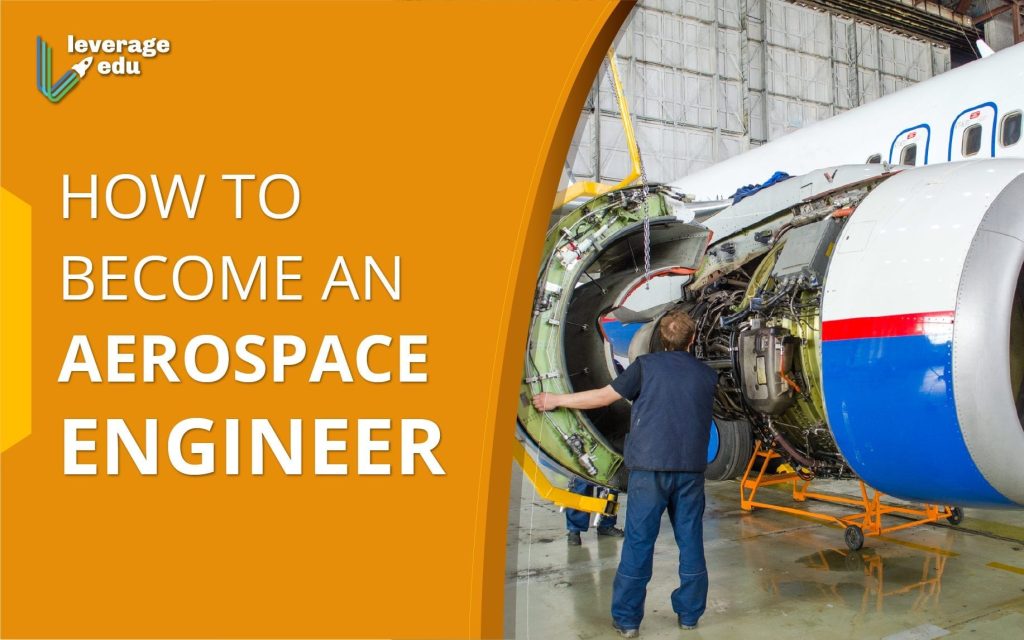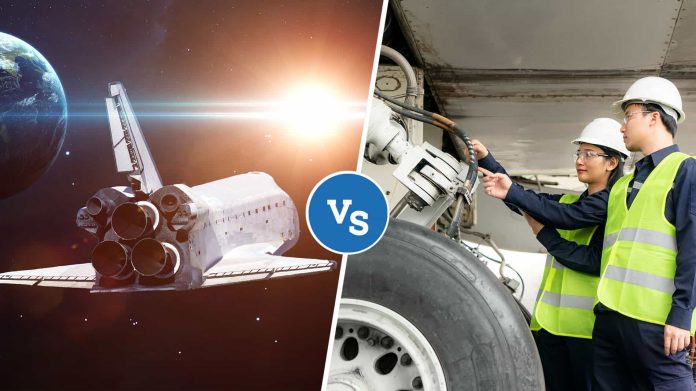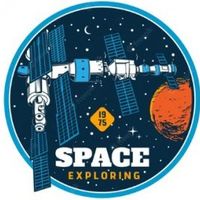Aeronautical engineering is very close Aerospace Engineering vs Aeronautical Engineering to the term Aeroautics.Aeronautics is Aeengineering is the branch of engineering science that deals with the design,manufacturing and construction of aircraft.in fact,aeronautical engineering deals with those flying objects which can operate in the atmosphere of earth.
Aerospace Engineering vs Aeronautical Engineering
The roots of aeronautical engineering originated from the early days of mechanical engineering,to innovators concepts.
In the early days,the sketches of flight vehicles were drawn by Leonardo Da Vinci,who designed the first flying body.
The revolution in aircraft development came through in 1979 when Sir George Cayley,an English man,drew an aeroplane incorporating a fixed wing for lift,an empennage(consisting of horizontal and vertical tail surfaces for stability and control),and a separate propulsion system.After that,on December17,
1903 following sir Cayleys mechanism,the wright brothers made the first aircraft which was an unforgettable history.Aeronautical engineering is avery special branch of engineering that deals with the flying bodies.
Aeronautical Engineering attracts those stude3nts who have an interest in designing,constructing and maintaining aircraft.Aeronautical Engineering also includes the techniques of operating aircraft and rockets within earths atmosphere.

Read more
internships in aerospace engineering -Summer 2024 Intern
how many years to become a data scientist in usa
how to become a data scientist with no experience
Aerospace Engineering:
Aerospace Engineering is comparatively one of the broader aspects of engineering.Conceptionally,Aerospace Engineering is the study of engineering science which is concerned with the design,development,testing,and production of aircraft,spacecraft,and related systems and equipment.
This field truly focuses on theories and problems related to both atmospheric and space flight,having two branches one is aeronautcval engineering and the other is astronautical engineering.
Aeronautical Engineering deals with the flying objects within the boundary of earths atmosphere.On the other hand,Astrnautical engineering deals with the opbjects,vehicles,and other equipment used in space.In addition,astronautical engineering deals with the spacecraft.
In fact,Aerospace Engineering is the primary field of engineering which is concerned with the design,development,testing,and manufacturing of aircraft and spacecraft.This field of engineering side deals with both the atmospheric and space flight.
The origin of Aerospace Engineering can be traced back to the aviation pioneers around the late 19th to early 20th centuries,although sir George Cayley dates from the last decade of the 18th to mid 19th century.In the history of Aerospace Engineering 17th December 1903 is widely considered the mosk remarkable day.
its It’s the day when Wilbur and Orville Wright successfully made four brief flights at Kitty Hawk in North Carolina that would go down in history as the discovery of the first airplane.
After two decades of this unforgettable history ,Edward Dawson opened a business rebuilding automotive engineers in Englande.
Since then,the aerospace sector has significantly changed and brought a revolution all over the world.Now-a-days Aerospaqce Sector is the worlds most popular sector to which people across all over the glove are ingressing themselves in this sector which is really an astonishing throughout the whole world.
Now,lets see what type of core subjects are taught in both Aeronautical Engineering and Aerospace Engineering.
Read The Articel
INTERNSHIPS IN AEROSPACE ENGINEERING
Here are the core Aeronautical Engineering subjects:
#1.Aerodynamics
#2.Aerospace Propulsion
#3.Fluid Dynamics
#4.Aircraft Transportation Systems
#4.Aircraft Structures
#5.Flight Mechanics
#6.Aircraft Design
#7.Automatic Control and Guidance
#8.Solid Mechanics
#9.Electronic Systems
#10.Ground Vehicle Systems
#11.Computer Aided Smulations(Solidworks,Ansys,CAD,CFD etc.)
#12.Thermodynamics and Heat Transfer
#13.Engineering Chemistry
#14,Engineering physics
#15.Engineering Mathematics
#16.Avionics
#!7.Aeroelasticity
The core courses that are taught in Aerospace Engineering are given below:
#1.Incompressible Fluid Mechanics
#2.Aerospace Structural Mechanics
#3.Thermodynamics and Propulsion
#4.Flight Mechanics
#5.Spaceflight Mechanics
#6.Aircraft Instrumentation System
#7.CAR(Civil Aviation Regulation)
#8.Aircraft Maintenance and Practice
#9.Aircraft System
#10.Air Navigation and Air Transportation
#11.EEE- a.Basic Electrical Engineering
b.Basic Electronics Engineering and Information Technology
c.Electrical Technology and Machines
#12.CSE- a.Introduction to Computer Programming
b.Introduction to Matlab
#13.CFD(Computational Fluid Dynamics)
#14.Computer Aided Simulation (Solidworks,CAD etc.)
#15.Heat Transform
#16.Introduction to Space Technology
#17.Space Mechanics
#18.Mechanics of Materials
#19.Space Systems and Technology
#20.Engineering Physics
#21.E#ngineering Chemistry
#22.Engineering Mathem,atics
#23.Aircraft and Spacecraft Design
#24.Avionics
#25.Astrodynamics
#26.Aeroacostics
Aerospace Engineering vs Aeronautical Engineering
Hopefully,after coming through this portion you have gained some basic knowledge both of Aeronautical Engineering and Aerospace Engineering.At Present,we will go through the key differences between these two engineering subjects.so,lets goo……….

Key differences between Aeronautical Engineering and Aerospace Engineeering:.
Circumference:Aeronautical Engineering deals with the flying objects and mechanisms which fly in the atmosphere of earth.Those flying objects include aircraft,gliders,helicopters,kautogyros,airships,ballons etc.
On the other Hand,Aerospace Engineering deals with both the aircraft(gliders,helicopters,UAV,fighter aircrafts etc) and spacecraft(Space shuttle,Space Probe etc.).It means the circumference of aerospace engineering is extremely large.
Aerospace Engineering vs Aeronautical Engineering
Education:
Most Aeronautical Engineers have to follow these steps to work in the industry:
For BSc degree,
a.Earn a four Bachelor of Science Degree in Aeronautical Engineering or Aerospace Engineering
b.Earn optional certification from the civil aviation authority or industry organizations
For MSc Degree,
a.Pursue a masters degree in Aeronautcs for more advanced job opportunities.
b.Get a Doctorate Degree to transition into Aeronautics Teaching.
Most Aerospace Engineers have to follow these steps to work in the industry:
For BSc Degree,
a.Earn a fiur year Bachelors of Science Degree in Aerospace Engineering
b.Earn optical certification from the Civil Aviation Auhorities or Space Agencies(NASA,ISRO,ESA etc.)
For MSc Degree,
a.Pursue a masters degree in Aerospace Engineering for more advanced job opportunities
b.Get a Doctorate Degree to transition into the aerospace fields
Besides these,You can also reseach in aeronautical engineering or aerospace engineering to establish yourself for a better future.
Skills:Both the Aeronautical Engineers and the Aerospace Engineers have to be very skillful in their perspective fields.Some of them are given below;
Aeronautical Engineers need these type key skills:
a.they should have strong mathematical,analytical,and problem solving skills
b.they should be technically very smart
c.they should have avery creative and innovative thinking power
d.they should have strong attention skills to detail
e.they should have a brief knowledge of safety issues
f.they should have strong communication skills
g.they should be very punctual to time management
Aerospace Engineering vs Aeronautical Engineering
Likely Aeronautical Engineers;Aerospace Engineers also need to have skills.Some of the most important skills of Aerospace Engineers are given below:
a.they should have strong thinking power which will help in vey crucial situations
b.they should be technically very expert
c.strong mathematical and analytical ability
d.complex problem solving-to define complex jchallanges and to analyze relevant information in order to create and evaluate alternatives and to incorporate solutions
e.operation analysis:To construct a design,analyze needs and product requirements
tracking:Monitoring\assembling themselves,other people,or organisations output in order to make changes or take corrective and proper decision at the same time
judgement and decision making: taking into account the relative costs and advantages of the possible acts,to select the most suitable one
f.Active learning:they should be very active and smart learning person in any situations
g.System Analysis:deciding how a system can operate and hoe results will be influenced by changes in any circumstances,procedures,and the environment
h.Design of technology:producing or modifying equipment and t5echnology to meet the need of the users
i.Negotiations:To put together people andtry to reconcile disagreements
j.personal Resources:inspiring,creative,and guiding individuals as they work,finding the best people for the job.
Job opportunities: The job opportunities of the aeronautical engineers are varied according to their skills. Some of them are given below:
a.Engineering Consultant
b.CNS Engineer
C.Aircraft Accident Investigation Officer
d.Aerospace Design Engineer
e.Mission Specialist















